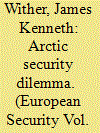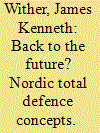| Srl | Item |
| 1 |
ID:
181643


|
|
|
|
|
| Summary/Abstract |
After the Cold War, international relations in the Arctic were characterised by cooperation and diplomacy. However, since Russia's annexation of Crimea in 2014, largely peaceful relations in the High North have been endangered by growing military competition between Russia and Western Arctic powers. The lack of military to military dialogue between Russia and the West has exacerbated the situation. Consequently, an Arctic security dilemma has arisen, which threatens stability and increases the danger of unintended armed conflict resulting from accidents or misunderstandings. Security dilemmas are as old as international politics. They occur when states feel threatened by the expanding military capabilities of their neighbours even if there is no deliberate hostile intent. This article will examine the developing Arctic security dilemma and the chances of its mitigation. Two recent developments provide potential grounds for optimism. The new United States’ administration has pledged to return America to global engagement and multilateralism. In 2021, the Russian Federation is scheduled to become chair of the Arctic Council and the Arctic Coastguard Forum, the main intergovernmental institutions in the region. These events provide an opportunity to rebuild greater trust and confidence in relations between Russia and its Arctic neighbours and alleviate dangerous tensions.
|
|
|
|
|
|
|
|
|
|
|
|
|
|
|
|
| 2 |
ID:
171141


|
|
|
|
|
| Summary/Abstract |
Russia’s aggression against Ukraine has forced the greatest a re-appraisal of European security since the end of the Cold War. In the Nordic region, this has led to preparations for great power armed conflict in the region after a long period of strategic neglect. All three of the Nordic states examined here, Finland, Sweden and Norway, have adopted so called total defence policies. Total defence combines the armed forces and civil society in a comprehensive whole of society approach to security intended to deter an attack by making a target state a very challenging prospect for an aggressor. Finland retained a total defence policy after the Cold War, but has had to re-examine its utility for the contemporary threat environment. For Norway and Sweden, total defence means significant challenges reviving Cold War era planning in a very different security and societal context. This study examines current Nordic security concepts through the critical, elements of total defence policies: national resilience and territorial defence. It also addresses the role that alliances and partnerships play in contemporary Nordic total defence planning. An important question is the extent to which these total defence concepts effectively address the perceived political and military threat from Russia.
|
|
|
|
|
|
|
|
|
|
|
|
|
|
|
|